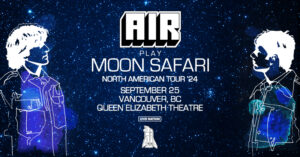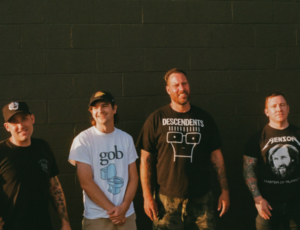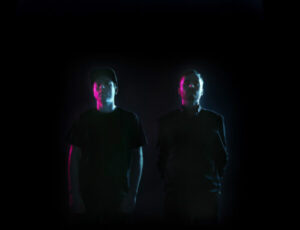Bob Marley (RIP) will forever be the face of reggae. His “One Love” philosophy, combined with his politically-infused songwriting, has inspired millions around the world to “Get Up Stand Up”. Deeply influenced by social issues in Jamaica, Bob Marley’s songs have become anthems for blue-collars all around the planet. Bob Marley is reggae, and The Wailers are keeping his message alive.
I caught the tail end of Shane Philips’ set on Saturday. The stage was lit with interchanging lights tinged with blues, greens and oranges. The bass was heavy, and the didgeridoo Philips was playing flavoured the music with island vibes. An apt statement considering Shane hails from Quadra Island. His intoxicating brand of tribal music was captivating the crowd. Philips’ didgeridoo swallowed the room with guttural grumbles, and impressed the audience with the skill of circular breathing. To be honest, I was pleasantly surprised, and glad to have witnessed those last moments before the curtain fell on the night’s first opener.
After Philips’ set the night took a sharp turn sideways. Next to take the stage was Roger Steffens – Bob Marley historian, reggae archivist, photographer, journalist. Most people in attendance (myself included) were expecting another band to come out. But instead, Steffens came out with the intent of educating a ballroom full of Saturday night partiers on the legacy of Bob Marley. Don’t get me wrong – I thoroughly enjoyed his half-hour presentation, which included a short film, a lecture on Bob (whom he joined on the original Survival tour), and a detailed description of the meaning behind each song on Survival.
As a music fiend, I thought Steffens was a passionate, well-versed storyteller. The only problem was keeping the crowd quiet. An enormous percentage of the people in attendance were smoking joints comparable in thickness to a broomstick, and drinking beer like it was going out of style. Pretty regular behaviour for a Saturday night concert at The Commodore. Steffens was obviously frustrated on stage, constantly reminding the crowd to keep it down so he could continue with his speech. Personally, I think he would have been better off going on first before everyone was hyped up with music, drugs, and alcohol. However, all things considered, it provided a greater insight into the mindset behind the album about to be performed. Steffens walked off stage to a mixed reaction of half-hearted claps, people who didn’t even notice his exit, and those who clapped and cheered. Essentially, the reaction to his departure was a proper representation to who spent their time listening, chatting, or were just way too high to focus on anything but their fingertips.
The Wailers play a distinct kind of music that can be played in any sort of setting. Their music can be played in the sun or in the rain, in happiness or in pain, and makes you want to keep pushing that repeat button again and again. As a result, the crowd was diverse. On one end of the spectrum, there were die-hard reggae fans who have been around since the beginning. And on the other end, there were twenty-something year olds jumping up and down in anticipation of their first reggae concert. Old fans or new, it didn’t matter, because unity was the night‘s theme. The “One Love” philosophy prevailed and it was Marley’s lyrics that brought everyone together.
The band came out a few minutes past eleven o’clock. After Steffens’ speech, we were all more than ready for some classic reggae tunes. The Wailers are fronted by Dwayne Anglin, a man who does more than justice to Bob‘s songs. Dwayne sounded and looked like a young Bob Marley on stage, and sang with that eyes-closed type of feeling that made his music authentic. The first half of the set was dedicated to the Survival album in its entirety. A political album that’s charged with the message of African and human solidarity. This album mobilizes the need for social justice, with songs like “So Much Trouble in the World” and “Zimbabwe”. The crowd responded to these slower, politically-focused songs with waving arms and bending knees. After they played the entire album (about forty minutes or so), The Wailers exited the stage and bid us adieu (or so we thought). It didn’t take long, however, for the seven members of the band to come back for the second half.
During the second set, the party cranked up a notch. The Wailers performed a huge chunk of their singles, and recognizable hits (“Exodus”, “Stir It Up”, “Could You Be Loved”, to give you a taste). This resulted in Anglin playing the role of maestro, and everyone in attendance given the role of the choir. It’s incredible how many people know every single lyric to Marley’s songs. Not to belittle Survival in any way, but the second half was much more of an engaging concert. Anglin was not shy to point the mic at the crowd for almost every song. However, mic or not, looking around I could see almost everyone’s lips moving to the rhythms of reggae.
At the end of the night, my expectations had been surpassed. A fuzzy feeling I associate with being cozy or loved filled my pores after the show. And, I left the venue with a deeper appreciation for The Wailers, Bob Marley, and reggae in general.










